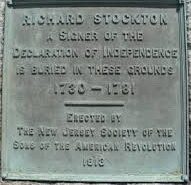Richard Stockton, Signatory the Declaration of Independence
Richard Stockton was certainly the wealthiest of the five New Jersey signers of the Declaration of Independence. He was also probably the best educated of them and worked for a well-known and highly regarded Newark law firm.
Born in 1730, Stockton showed no interest in politics, enjoyed living a luxurious life in the Princeton family estate of Morven, later the Governor’s Mansion for many years and now a museum. Stockton was polished and described as an enlightened politician as well as a graceful speaker.
But it was his legal studies that led to his being involved to help the colonies become an independent nation, as well as the inspiring speaking of John Adams when he and the other four New Jerseyans went to Philadelphia to vote on the Declaration the month before the vote was taken.
He was also concerned for his fellow man, best evidenced when he was sent to inspect troops in New York state and was shocked at the lack of supplies and clothing the New Jersey volunteers had. So when he learned the British were nearing Morven, he returned home to the estate, and before even moving his wife and children to safety further away in Monmouth County, he helped feed, clothe and supply the colony soldiers who were in the area.
Loyalist militants roused him from his home at night, took him prisoner and jailed him in Perth Amboy before moving him to New York where his health was severely diminished in that prison for more than a month and led his becoming an invalid.
Whether he was released from prison through a prisoner’s exchange program or the intercession of General Washington is not precise, however, he returned home extremely ill and never able to recover.
Stockton’s statue is one of the two representing New Jersey in the Statuary collection at the nation’s Capitol, with Civil War hero General Phillip Kearny in Statuary Hall and Stockton in the Capitol crypt. It has been part of the 100-statue collection since donated by the state in 1888. Stockton State University was named for Stockton as was the village of Stockton and several other smaller honors.
Earlier in his career, Stockton served on the governing Council of New Jersey and the New Jersey Supreme Court, before being named to the Continental Congress and going to Philadelphia in time for the final debates and approval of the Declaration of Independence.
Suffering from the effects of his imprisonment together with a cancerous mouth and jaw, Stockton died at Moven Feb. 28, 1781. He was the second of the New Jersey Signers, after John Hart, to die.
He is buried at Stony Brook Quaker Meeting House cemetery in Princeton.
